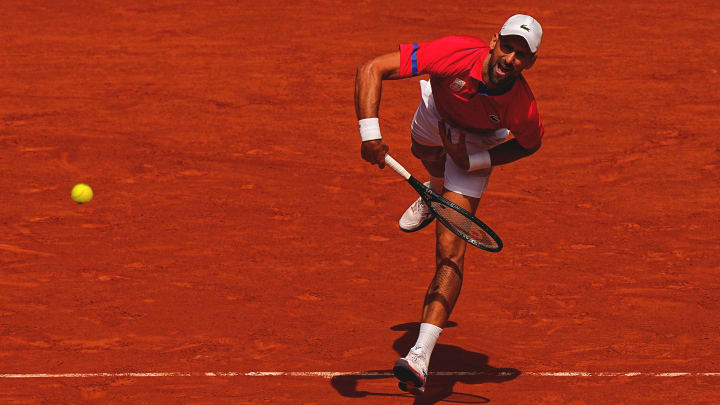Novak Djokovic Goes From Hobbled to Heroic to Win Elusive Olympic Gold Medal

PARIS — There is no good explanation for what Novak Djokovic did here Sunday afternoon except that he is Novak Djokovic. At 37 years old, two months after surgery to repair a torn meniscus, Djokovic was clearly hobbling and frequently appeared to be in pain. Carlos Alcaraz, who happens to be the best player in the world, taunted Djokovic with drop shots, forcing him to go where his knee did not want to take him. Alcaraz never lost a service game, and he finished 33 with winners, compared to 15 for Djokovic. What he did not finish with was a gold medal.
Djokovic beat Alcaraz, 7-6 (7-3), 7-6 (7-2). Djokovic has always been an expressive player, but there were times in this match when he seemed especially frustrated by forces beyond his control. His problem was not hitting shots; it was getting to them. Djokovic is the best in history at seizing control of a point he seems sure to lose. But in this match, there were balls he would normally track down that he didn’t even bother to chase—or when he did, he got there later than we have come to expect.
This sounds contradictory, but it’s true: Djokovic did not look his best, yet he played some of his best tennis. Alcaraz summed it up: “Hungry Novak … an impressive player today.” Someday, when Alcaraz’s grandkids ask him what made Djokovic great, this performance at Roland Garros would be a fine place to start.
“When I take everything into consideration,” Djokovic said afterward, “this is probably the biggest sporting success I’ve had in my career.”
Two months ago, Djokovic withdrew from the French Open before the quarterfinals because of his knee injury. He seemed unlikely to even play in Wimbledon right up until the tournament started. He made it to the final, where, he said Sunday: “I was dominated in the final by Alcaraz, who was a far better player.”
Many players, maybe even most players, would have skipped the Olympics to rest and prepare for the U.S. Open. (Some players did skip this, anyway.) But Djokovic said, “I did everything I possibly could to prepare myself … to raise form when it needs to be raised.
Djokovic arrived here having won 10 Australian Opens, seven Wimbledons, four U.S. Opens and three French Opens. He was the most accomplished male player in history. The only person in the world who thought his career was missing anything was him.
Djokovic had never won an Olympic gold medal. He won bronze in Beijing in 2008. He lost in the semifinals in London and Tokyo. He wanted gold desperately, and one reason this match was such great theater is that it was almost certainly his last chance. The other reason was Alcaraz.
Alcaraz is 20 grand slam titles away from catching Djokovic. It is absurd to even discuss the possibility, but it is also irresistible, because Alcaraz is a rare talent. At 21, he has already won four slams, and he has won on all three surfaces.

Both men said afterward that the pressure of the Olympics was even greater than what they feel at Grand Slams. Djokovic said, “The fact I lost as easy as I did in the finals at Wimbledon probably worked in my favor because I knew that I couldn’t do worse than that.” With the first set in Paris tied 4–4, Djokovic fended off five break points. In both tiebreakers, Djokovic was the superior player. Alcaraz acknowledged that afterward: “I felt the pressure in those situations, that I couldn’t play my best tennis.”
When the match ended, Djokovic seemed as stunned as he was happy—he ended up prone on the ground, face down, his right hand shaking against the clay. When he got up, he found a towel, sat in his chair and covered his sobbing face.
“I thought that 2012 opening ceremony, carrying the flag for my country, was the best feeling that an athlete could have,” the best male tennis player in history said Sunday. “This supersedes everything that I imagined, and everything I hoped I could experience and feel.”

Michael Rosenberg is a senior writer for Sports Illustrated, covering any and all sports. He writes columns, profiles and investigative stories and has covered almost every major sporting event. He joined SI in 2012 after working at the Detroit Free Press for 13 years, eight of them as a columnist. Rosenberg is the author of "War As They Knew It: Woody Hayes, Bo Schembechler and America in a Time of Unrest." Several of his stories also have been published in collections of the year's best sportswriting. He is married with three children.
Follow rosenberg_mike